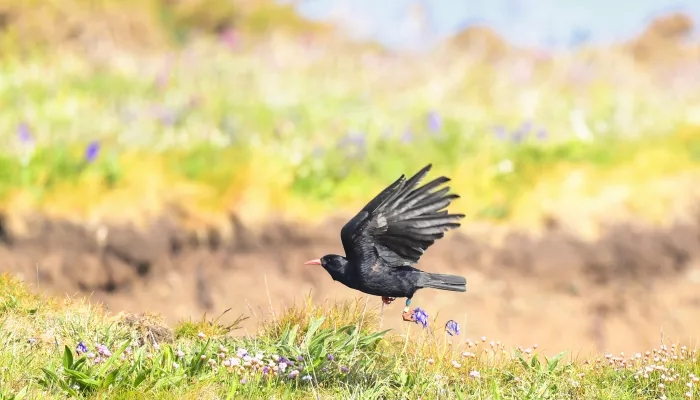
Legend has it that the chough obtained its bright red beak and legs from paddling in the blood of Sir Thomas Becket following the Archbishop's gruesome murder by four of King Henry II’s knights in Canterbury Cathedral, yet anyone who spends time around the birds finds that depiction hard to believe.
Since being released in Dover in July, the choughs have grown stronger and GPS tracking shows they are travelling further. The team were certaintly "chuffed" when English Heritage staff spotted the birds sitting on a window ledge at Dover Castle. The chough, which features on the Canterbury coat of arms and has strong connections in Kent, disappeared from the county 200 years ago. However, charities Kent Wildlife Trust and Wildwood Trust supported by Paradise Park in Cornwall, have been working to reintroduce the iconic species back to the county.
Liz Corry, Chough Supervisor at Wildwood Trust said: “Choughs are incredibly intelligent and they have strong personalities, they are inquisitive and sociable. They love probing around in animal dung using their long breaks to pick out insects such as dung beetles to feed on.”
“They form strong social groups and learn from each other. Since their release, we have watched them work together to chase off buzzards and rally around to warn one another about any nearby peregrine falcon: their natural predator.
Choughs disappeared from our Kentish landscape through loss of habitat and persecution, so we are keen to showcase the incredible nature of this brilliant bird and encourage people to take pride that they are back in our countryside.Liz Corry, Chough Supervisor at Wildwood Trust
The appearance of the chough at Dover Castle has given cause for all of those involved in the project to celebrate, on spotting and photographing the birds. Colin Wiltshire of English Heritage said: “We are delighted to see the choughs making it over to the castle, we have been proud supporters of the project since it began, and this is a milestone moment.”
Over the last year, visitors to Dover Castle have delighted to see four red-billed choughs kept in an aviary on the site. The birds had been placed there to act as ambassadors for the reintroduction project. As they are breeding birds, they have now been taken back to their home in Paradise Park, Cornwall where they will resume their role in the breeding programme, and the aviary at Dover Castle has been dismantled. In the future, it is likely that the offspring of those four birds will be soaring over the castle where their parents were once kept.
Paul Hadaway, Director of Conservation for Kent Wildlife Trust said: “This is an exciting development, it shows the science behind the release is working and the birds are doing well, growing in confidence, and quite literally spreading their wings. We have been able to reintroduce them following extensive habitat restoration working with land owners and other partners to make sure the birds have a landscape that can sustain them and allow them to go from strength to strength.”

